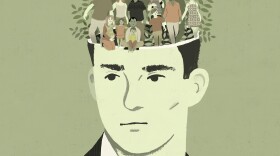
Shankar Vedantam
Shankar Vedantam is the host and creator of Hidden Brain. The Hidden Brain podcast receives more than three million downloads per week. The Hidden Brain radio show is distributed by NPR and featured on nearly 400 public radio stations around the United States.
Vedantam was NPR's social science correspondent between 2011 and 2020, and spent 10 years as a reporter at The Washington Post. From 2007 to 2009, he was also a columnist, and wrote the Department of Human Behavior column for the Post.
Vedantam and Hidden Brain have been recognized with the Edward R Murrow Award, and honors from the American Association for the Advancement of Science, the Society for Personality and Social Psychology, the International Society of Political Psychology, the Society of Professional Journalists, the National Association of Black Journalists, the Austen Riggs Center, the American Psychoanalytic Association, the Webby Awards, the Pennsylvania Associated Press Managing Editors, the South Asian Journalists Association, the Asian American Journalists Association, the Pennsylvania Newspaper Association, the American Public Health Association, the Templeton-Cambridge Fellowship on Science and Religion, and the Rosalynn Carter Mental Health Journalism Fellowship.
In 2009-2010, Vedantam served as a fellow at the Nieman Foundation for Journalism at Harvard University.
Vedantam is the author of the non-fiction book, The Hidden Brain: How our Unconscious Minds Elect Presidents, Control Markets, Wage Wars and Save Our Lives. The book, published in 2010, described how unconscious biases influence people. He is also co-author, with Bill Mesler, of the 2021 book Useful Delusions: The Power and Paradox of the Self-Deceiving Brain.
-
Have you ever noticed that when something important is missing in your life, your brain can only seem to focus on that missing thing? Two researchers have dubbed this phenomenon "scarcity."
-
Imagine seeing a cockroach skitter across your kitchen counter. Does the thought alone gross you out? This week on Hidden Brain, we discuss disgust.
-
Boys get the message quickly: a man is supposed to be strong and independent. That message, researchers say, has widespread consequences for men's social lives and physical health.
-
Economic theory rests on a simple notion about humans: people are rational. But a half century ago, two psychologists shattered these assumptions.
-
A culture of racism can infect us all. On this week's radio show, we discuss the implicit biases we carry that have been forged by the society around us.
-
Our culture has long expected that women will be kind, and leaders will be authoritative. So what's a female leader to do when she confronts these conflicting stereotypes?
-
Envy is an unflattering, miserable emotion. It can prompt us to improve our lives — and also cause us to feel resentment, rage, and a desire for revenge.
-
Flight delays and late arrivals have gone down since 1990. At the same time, airlines have increased scheduled flight times because flights are taking longer, and more time is spent taxiing.
-
Several years ago, sociologist Brooke Harrington decided to explore the secret lives of billionaires. What she found, she said, shocked her.
-
Marriage is hard — and there are signs it's become even harder in recent decades. We examine how long-term relationships have changed, and whether we might improve marriage by asking less of it.










